#fumiko hida
Explore tagged Tumblr posts
Text


5 notes
·
View notes
Text

Children Who Chase Lost Voices (Makoto Shinkai, 2011)
Cast: Voices of Hisako Kanemoto, Miyu Irino, Kazuhiko Inoue, Junko Takeuchi, Fumiko Orikasa, Sumi Shimamoto. Screenplay: Makoto Shinkai. Cinematography: Makoto Shinkai. Art direction: Takumi Tanji. Film editing: Aya Hida, Makoto Shinkai. Music: Tenmon.
Myth-making anime fantasy, crafted with Makoto Shinkai's usual opulence, Children Who Chase Lost Voices draws on a variety of legends about the underworld, including Orpheus's journey to Hades to reclaim Eurydice. The protagonist is a young girl, Asuna, who finds herself in a subterranean land called Agartha, accompanied by her teacher, Mr. Morisaki, who knows a good deal, though not enough, about Agartha. He wants to go there to see if he can bring his dead wife back to life. Asuna is driven by curiosity about a strange boy named Shun, whom she met on her wanderings in the hills near her village. They discover that they have to deal with the animosity of the residents of Agartha toward people from the upper world. (The subtitles call them "Topsiders," which for me has a distracting footwear overtone.) It's too creepy and violent for younger kids, and some of its plot points, such as the suggestion that Agartha has been exploited by malign upper-world forces like the Nazis, need better context. But it's never boring and always a treat for the eye.
6 notes
·
View notes
Text
Digimon Adventure 02 Appreciation Challenge - Day 9
Day 9: Which family dynamic in 02 do you find the most interesting?

The Hida family dynamic is interesting because, as much as it’s determined by who is in the picture, it’s equally determined by who isn’t.
First of all, can I point out that Iori’s family is the only fully named family in 02? We don’t know the names of Daisuke, Miyako and Ken’s parents, but for the Hidas we get all of them. Grandpa Chikara, mother Fumiko, father Hiroki.
Iori comes from a rather traditional Japanese upbringing - his grandfather is a kendo master, his mother’s Japanese cooking is brought up several times (she’s apparently very good!), they even have a butsudan (Buddhist altar) in a room with tatami flooring. They pray to it and everything! Iori speaks in perpetual teneigo, or polite language, as expected of a boy raised in such a traditional environment. Additionally, Iori’s father and grandfather before him were also police officers. Thus, Iori’s strong sense of justice, and very black and white dichotomy of good and evil.
Iori loves and respects his family, and especially his grandfather - Chikara is the father figure in his life, not only teaching him kendo but also imparting wisdom to him on a regular basis. Fumiko, Iori’s mother, usually shows up in the context of Iori having to do something very important that he can’t talk about. When that happens, Chikara always bails him out, because it’s quite clear that it hurts Iori deeply to even think of lying to his mother. He has too much respect for his family to blatantly lie to them.
Part of Iori’s character arc is learning to open up to new possibilities, and evolving his sense of justice from its rigid form into something much more flexible and inclusive. This is something Chikara seems to have been actively working on throughout 02 - his lessons to Iori always emphasized that he should be true to himself and do what he feels is right, and also be flexible in heart and mind. Chikara obviously learned from his dealings with his son and his best friend how important this is. I think he was probably pleased that Iori chose his own path of upholding justice as a defense attorney.
And then there’s Hiroki. It’s amazing how a long dead guy can have so much presence in the lives of their loved ones. From the few silent flashback scenes you get of him, he seems like the kind of person that would light up a room with his presence, with that big encouraging smile and open laughter. And he was the kind of person to put himself between a person and a bullet to save their life at the expense of his own! No wonder he’s so missed, he was probably an amazing guy.
Even early on in the series, you can tell Hiroki’s absence weighs on Iori heavily - in episode 3, he cites his late father’s words as something he must follow (in that case, finishing a dreaded cherry tomato because he “shouldn’t waste food”). In the last arc, when faced with big moral dilemmas, he keeps asking himself, “What would father thing?” “Would Father do something like this?” “Would Father approve of what I just did?” Iori was a kindergartner when Hiroki died, and as such he doesn’t really know who his father was, really. He was just too young. He’s clinging to what little he can remember his father said, and tries hard to figure out what his father would think of him now.
I think that’s why he takes everything Chikara says so seriously and absolutely. No one in his life knows his father better than Chikara did; Chikara raised Hiroki, and taught him many of the lessons that he is now teaching Iori. In a way, to get an idea of what his father was like, he has to go through Chikara.
You’d think learning his father had a deep connection to the Digital World, something they both share, would make Iori obsess about his father even more. In episode 49, this knowledge does trap him in the illusion where he shows the Digital World to his father. But by this point, Iori has grown a lot. He has seen how clinging to the past can ruin a person. He knows he can’t show the Digital World to his father or ask him what he thinks about things. But he now knows he can introduce Armadimon to his mother, and he can work on understanding the people around him more and creating a better future. There are things in his life here and now that he can and should focus on. And that’s why, as much as it hurts, he is ultimately able to let go.

29 notes
·
View notes
Text
An analysis of Iori and his character arc

Iori has a particularly interesting position in 02′s narrative (and, even more widely so, in perhaps all of both Adventure and 02) in that his base profile is rather unusual-looking even from the get-go -- the youngest child in both groups, yet with a (seemingly) mature demeanor that surpasses even his seniors. On top of that, Iori ends up having a very deep relation to 02′s themes and plot itself in a way that isn’t initially apparent, but actually makes him a very vital centerpiece of 02′s story.

Before we get into Iori’s role in 02′s actual plot, it needs to be established that a very, very large amount of Iori’s character is heavily shaped by his family background and upbringing. Prior to the start of the series, the Hida family had a large void in it, with Iori’s father Hiroki having been killed in the line of duty. Being a mere five-year-old child who had lost his father barely into actually being sentient and basically had to live the following three years going off hearsay on what he was actually like, Iori ends up raised by his mother Fumiko and his paternal grandfather Chikara.
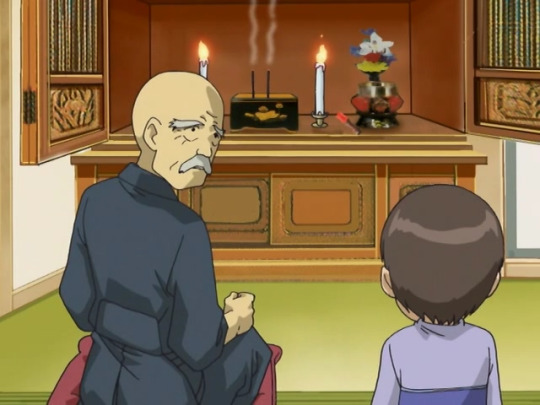

While not in exactly the same way as the Takenouchi family (which is literally working in cultural preservation and study), the Hida family is very traditionalist Japanese -- Fumiko makes traditional Japanese food and snacks like kanpyoumaki and ohagi, and a lot of attention is given to the butsudan altar in their house where they honor the late Hiroki (also note the tatami flooring). That, combined with Chikara’s naturally strict personality, led to Iori being raised with “very strict manners”, and by a set of very firm guidelines on honor, respect, and the like.
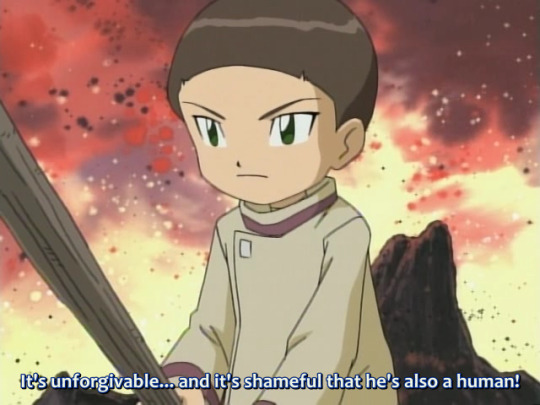
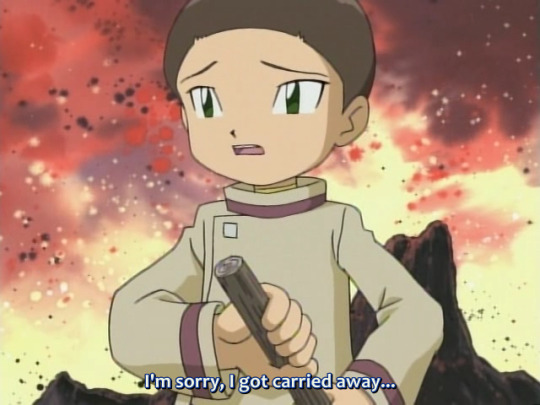
Having been raised into this kind of formality, Iori speaks almost exclusively in polite-form Japanese. This happens to initially make him come off a bit like Koushirou -- likely a deliberate parallel, given the Knowledge connection between the two (being the kind of person who admits that you don’t know everything and wants to know more requires a bit of humility, after all). That said, Iori’s way of doing this has some key differences from Koushirou:
Unlike Koushirou, who was largely polite out of an attempt to keep distance from everyone and thus had a streak of being somewhat non-confrontational, Iori is perfectly willing to say harsh or critical things -- in other words, his way of speaking is formal, but it’s not necessarily polite, and in fact Iori is probably the single most passive-aggressive person in this cast. He has absolutely no qualms about dunking on whatever he feels truly deserves the dunking, and he’ll certainly do it with a lot of grace, but he is very capable of being extremely cold when he wants to be.
Koushirou stuck to formality out of detachment and intimidation, to the point that, as per Adventure episodes 38 and 54, he was compulsively unable to bring himself to speak casually unless he forced himself. Iori, on the other hand, often “slips” -- on top of willingly defaulting to casual form whenever he’s talking to himself or (occasionally) to the Digimon (who are outside Japanese levels of propriety), he also has a tendency to start using casual form whenever he gets particularly emotionally compromised. (While it doesn’t quite come off in the translation, the above screenshots from 02 episode 10 are an example of this, with Iori losing his temper at the Kaiser and slipping into casual form -- and a bit of fun foreshadowing, guess who’s the one to successfully calm him down? Takeru. Remember this for later.) In other words, Iori’s formality is not compulsive, but a conscious thing he tries to maintain as he holds himself to high standards, and is unable to completely uphold during times his emotions get the better of him.
Ultimately, Iori may come off as “mature and composed”, but he’s still an impressionable nine-year-old child, who’s effectively parroting the rules his grandfather instilled in him because he sees it as The One and Only Guide to Living Life. In trying to figure out the right thing to do in any situation, Iori ends up constantly trying to fall back on “this is the right way to do things!” and taking it rather badly whenever things start falling outside of the expected pattern. Despite being the one responsible for Iori’s tightly principled life to begin with, even Chikara himself comments that Iori’s not being flexible enough in his thinking in 02 episode 5 -- because it’s not like he’s expecting Iori to be like this, but Iori is simply having a hard time applying these principles practically when he’s working with the limited range of being a nine-year-old child.

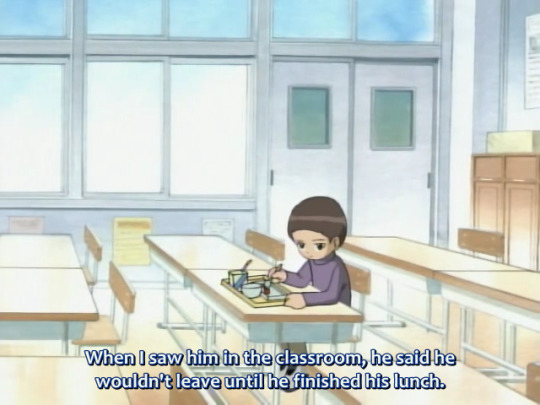
And as much as it may be tempting to see Iori as stoic, watching his expressions and way of emoting throughout the series, he does very much have the full range of emotions and curiosity and even cheer of a nine-year-old child -- it’s that he’s just constantly holding himself back for the sake of being principled and well-mannered. This has the unfortunate side effect that Iori is, as the Animation Chronicle calls it, “clumsy at expressing himself as a child”. Because he’s constantly restraining himself like this, he has a hard time expressing himself or letting himself enjoy things in the way a normal child would.
It also goes a long way in explaining why Iori is never seen hanging out with any other peers his age, and is exclusively depicted in the company of either the rest of the 02 group, or his own family. While part of it is simply because (as per Japanese school procedure) he’s too young to be formally enrolled in any clubs, 02 episode 3 goes out of its way to show Iori being left alone in the classroom with only a teacher stuck supervising him, as he tries to force himself to finish his lunch due to his stubborn adherence to principle (even though he seems to hate tomatoes). In other words, it’s heavily implied that Iori’s own behavior ended up isolating him from his peers. Considering that the 02 group is generally made up of kids who are socially displaced in some way, it naturally follows that, despite being significantly older than him, they end up welcoming him into their friend circle and treating him as an equal.
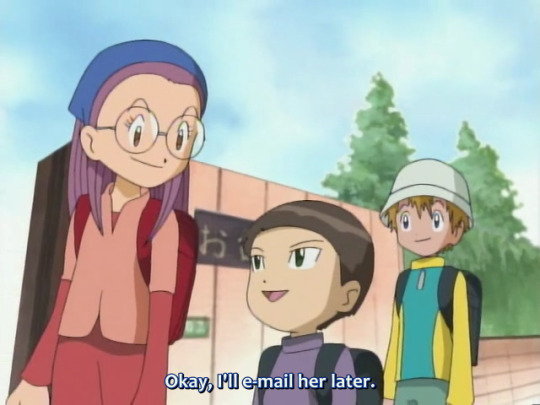
When the series starts, Miyako and Iori seem to have gotten a certain degree of closeness (with Iori as one of the only people Miyako drops honorifics on). It stands to reason that Miyako, being open-minded towards people and rather aggressively friendly, would be willing to befriend her neighbor despite the three-year age gap between them, and so they already seem to have developed a rapport where Miyako’s willing to come over to his place to help work on the Hida family electronics in exchange for food.

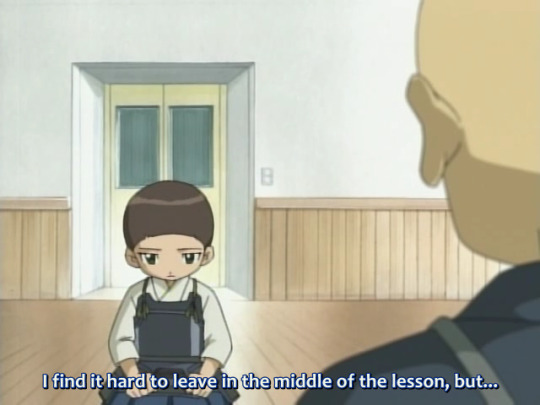
So, you know, this and that happens, Iori becomes a Chosen Child, and this is the start of where Iori’s “principles” start coming into conflict with each other. The nature of the Digital World crisis is a no-brainer -- the Kaiser is doing terrible things, and Iori’s just been given the tools to do something about it, and so for him, upholding his principles to do the right thing means proactively doing something about it. But getting involved in this territory war will mean “fighting and hurting other people” (bad) and “hiding things from his family and sacrificing obligations to them” (also bad). Chikara advises him in 02 episode 5 that he still needs to be the one to decide what he wants and needs to do at any given moment, but it’s clear that this is still a new concept for Iori to swallow.
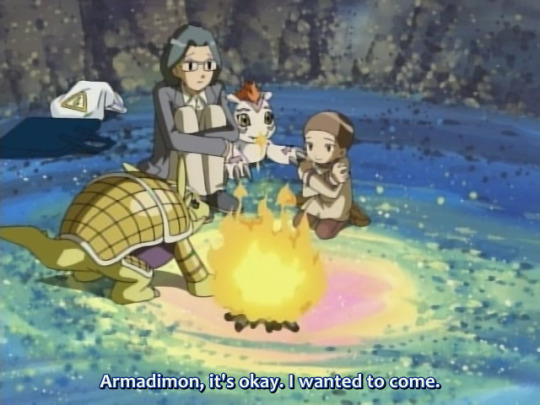
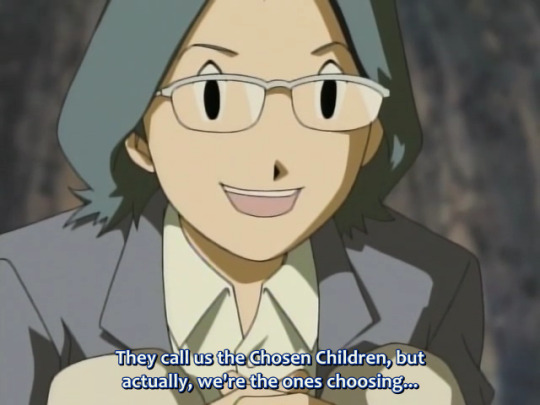
It’s also important that 02 episode 5 is also the episode that introduces Jou, who very much understood the dissonance between “adhering to principles in spite of how practical that may not actually be”, which means the two of them end up bonding over...ditching real-life obligations to come to the Digital World. This bonding happens despite the fact that they have the largest age gap out of any two given kids out of the Adventure and 02 group (Jou is 15, and Iori 9) -- and yet, they’re able to bond over being like-minded like this. And while they come from different contexts, there’s also a parallel drawn between the two on “the importance of personal choice” -- because back in Adventure, Jou’s story involved channeling his desire to help others in a way different from his usual expected path as a doctor or as a Chosen Child, and, likewise, it will be up to Iori to find his own way towards what he thinks is right.


Iori’s “adherence to principles” also needs to be distinguished from Jou’s in that Jou was someone more likely to be stuck to “practical” rules (one might call him Lawful) such as waiting for adults to help them with things, or what to put on eggs. Iori, on the other hand, has self-enforced rules that are far more ideological -- he doesn’t actually care that much about institutionally-enforced rules (note how he has absolutely no issue with sneaking into school with his friends in 02 episode 6) as much as he enforces a moral code on himself about “the right thing to do”. For instance, that he has to show his respect to Jou by formally finishing his introduction, even if it’s clear they know each other by now already.
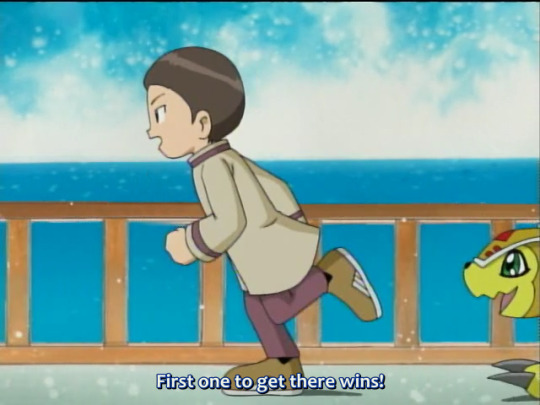



But, again, it bears repeating: Iori is a nine-year-old child. The rest of the kids respect him enough to not treat him like a younger child -- other than a brief moment of emotional compromise that Daisuke quickly apologized for, the group is never really depicted as paying particular mind or care to the fact that Iori is so much younger than them, and for the most part treat him like an equal. But Iori himself is conscious of this -- after all, it’s why he’s constantly speaking politely to everyone all of the time, but 02 episode 16 also implies he’s very self-conscious about this. The plot of the episode kicks off when Iori momentarily gets caught up in his excitement about potentially getting a new Digimental, and, once things start going south, he starts blaming himself for causing all of this and lashing out at the others for (at least, in his mind) singling him out to be the one to escape on the grounds of being the youngest. After all is said and done with the incident, Submarimon lets Iori have a moment of something Iori really does need: a bit of a chance to actually get to enjoy himself as a young child instead of restraining himself so much.

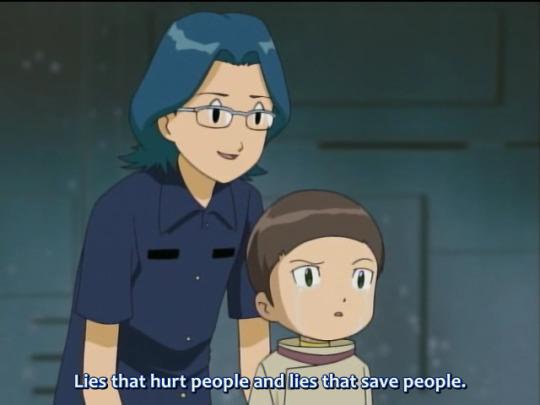
Speaking of 02 episode 16, this is also where we first get to see how the pressure of maintaining Iori’s moral code starts to emotionally tear at him. It’s the first time we see Iori lose his composure this much. To everyone else here (and, perhaps, the audience, to some degree), Iori’s making a mountain out of a molehill -- he’s calling himself an unworthy person for telling a lie that even Jou himself clearly didn’t mind. But remember, Iori is someone who’s still learning a lot about how the world works at such a young age and is inclined by default to fall back on whatever his grandfather’s told him (to a point that even said grandfather considers to be overdoing it). Right now, Iori has basically built his entire view of morality based on this kind of thing, so putting a dent on it is like encouraging a slippery slope of potentially falling into moral depravity.
The reason why I say Iori’s character arc has a lot to do with Adventure and 02’s storytelling itself is that it’s a surprisingly pragmatic series when it comes down to it -- “it’s okay to lie, sometimes” is not exactly the kind of moral you’d expect out of your average kids’ show, but, perhaps a bit unusually, this series prefers to skip all of the preachiness and focus on pragmatics. (After all, back in Adventure, a lot of the final arc revolved around the question of “is fighting the right thing to do when there might be casualties?”, with the probably-kind-of-uncomfortable-but-frankly-very-practical answer of “it certainly beats having more casualties that would happen if you sat around and did nothing.”) Iori’s character arc is, effectively, this in a nutshell -- what’s the “right” thing to do when following principles alone doesn’t seem to be doing it? In the end, both Adventure and 02 are big on this -- preachy words and moralistic principles mean nothing in the face of striving to practically minimize damage and help others.
And so, Jou -- who himself grappled quite a bit with the dissonance between principles and pragmatism back in Adventure -- is the one to successfully reframe it in a way that Iori understands: most of all, Iori doesn’t want to see people get hurt, and whether “lying” or “not lying” is the right thing to do is not as relevant as “whether people are getting hurt”. Iori not lying would have caused a great deal more of hurt than lying, and it’s through understanding this kind of principle that Iori accepts that he still has a long way to go in terms of exercising his duty to others. The secondary Digimental arcs have a heavy theme of “acknowledging your deficiencies and resolving to improve”, and in the case of Iori and the Digimental of (this thing has been translated half a dozen ways, but, effectively, honoring your obligations to others), it involves his first major moment of coming to terms with the idea that the principles on paper he’s been stubbornly following aren’t going to do it by themselves.

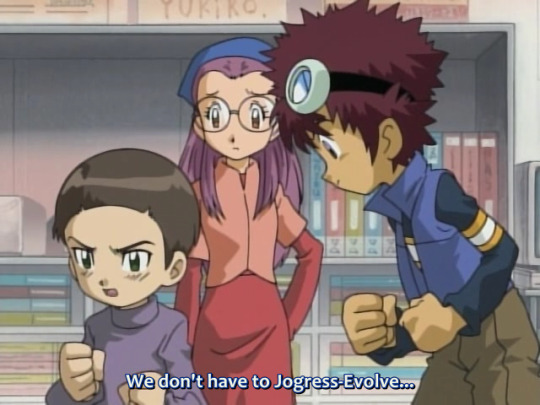
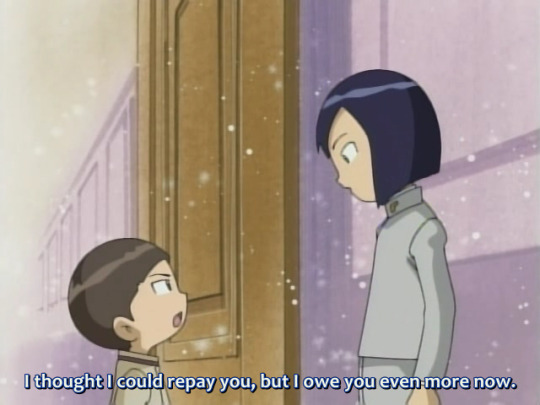
Once the Kaiser arc concludes and the group is posed with the question on how to handle Ichijouji Ken, Iori’s reaction to him is the most infamously extreme: Ken is a Bad Person who is completely beyond forgiveness, and Iori wants nothing to do with him. It probably needs to be made clear that Iori’s stance on not wanting to forgive Ken is not inherently unreasonable. Ken really did some awful, horrible things in the first half of the series, and it is completely within Iori’s rights to decide that he doesn’t want to forgive or like Ken thereafter.
The part where Iori’s behavior starts posing issues is not the part about whether he likes Ken or not, but rather that Iori gets so hung up on that lack of forgiveness that he becomes very bad at observing the practical reality in front of him. Or, in other words, Iori gets so fixated on the principle of what happened in the past that he’s unable to make good judgment calls on what should happen going forward. It is abundantly clear to everyone by (at the latest) 02 episode 26 that Ken is not going to easily lapse back into his old ways and would like to make an effort to repair the damage he caused; regardless of whether they like him or not, it’s in their best interest to cooperate with him and let him help out (and even keep an eye on him to make sure bad things don’t happen again!), especially when the factor of Jogress comes into play and turns out to be a very valuable asset in the fight ahead. But Iori has a a rather squeamish, petty response when he tries to claim that they shouldn’t need Jogress (in the midst of everyone else being excited about the possibilities it poses, even without Ken in the equation) in 02 episode 28, and even when he does go along with everyone working with Ken in 02 episodes 28-29 during the Giga House Incident, he approaches it like he and Ken are bartering favors and that he’ll have to “repay” Ken before he can properly return to pigeonholing Ken as an Unequivocally Bad Person.

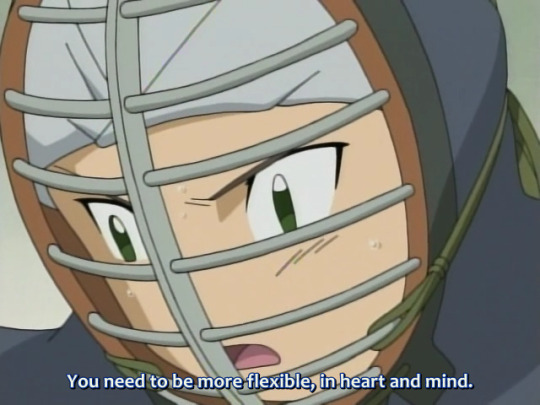
And so the issue here is: Iori being so determined to fixate on trying to stuff Ken into a neat box of a Bad Person isn’t good for himself, either, because it basically means he’s going out of his way to run pointless mental loops and maintain the feeling of stewing in a grudge against him, even when it’s helping absolutely nobody. Note the metaphor drawn when Iori practices kendo with Chikara in 02 episode 24 -- he keeps doing the same motion over and over again despite the fact it’s clearly not going anywhere, and Chikara has to warn him that doing nothing but aim for the head isn’t how you’re supposed to do it. Right now, Iori is having a hard time parsing things in ways besides shoving things in neat boxes of black-and-white morality, and this lack of flexibility is severely restricting his ability to be productive.


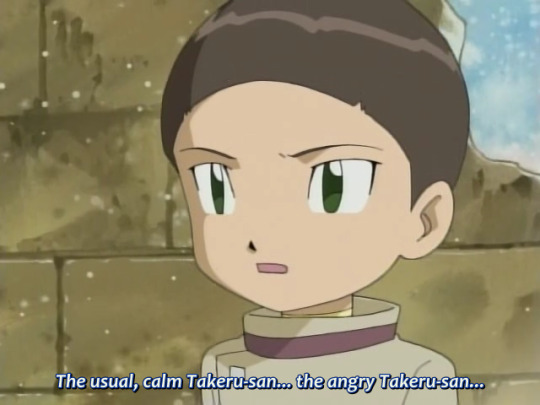
What starts to really cause Iori to make a major shift in his thinking process is none other than his connection with Takeru, a subplot that had already started kicking off all the way back in 02 episode 19, when Iori witnesses Takeru suddenly taking a violent shift in mood against the Kaiser to the point it scares him. Iori, of course, considers Takeru to be a “good" and “kind person”, but someone like that should (in his mind) logically not be making sudden, violent outbursts like that -- and especially once he starts advocating for BlackWarGreymon to potentially be killed if it comes down to it, going very against Iori’s fundamental principle that killing anything that’s sentient is unforgivably immoral.
This “contradiction” is what leads Iori to realize that he needs to do much more if he wants to understand Takeru properly, and it’s also the start of how Iori grows into the trait of his first Digimental, “Knowledge” -- or, more specifically (as defined by Koushirou in Adventure episode 24 and 02 episode 2), “curiosity and a drive to know more”. In the case of Iori, this manifests in “I want to know more about other people.” It’s Iori effectively understanding that his very limited view of the world and how people work isn’t sufficient in itself, and this concept becomes the crux of his character arc for the rest of the series.
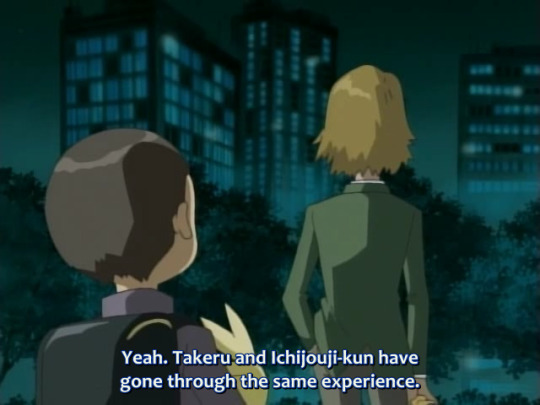
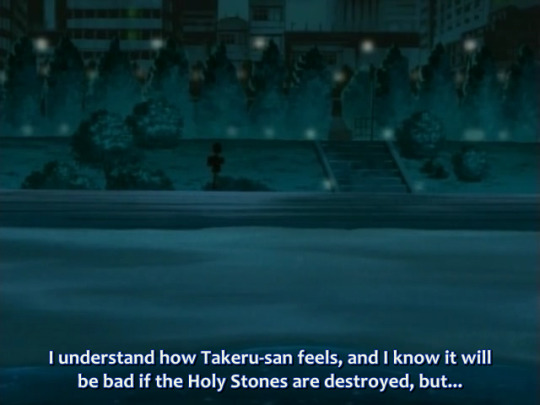
After tussling around and getting increasingly confused about Takeru’s seemingly paradoxical behavior, Iori finally goes directly to Yamato to consult him about it in 02 episode 35, and Yamato explains the backstory behind Takeru’s trauma from losing Angemon back in Adventure episode 13, as well as a reminder that as much as it may have been his own fault, Ken technically went through some pretty similar trauma, and everything that’s happened since his fall from being the Kaiser hasn’t exactly been sunshine and roses for him either. Iori reflects on this as he goes home, with the important statement attached: he understands Takeru’s feelings. He’s now able to understand why Takeru acts the way he does, not on the grounds of principles of what’s right or wrong, but based on the fact that Takeru’s simply��a very messy human being who’s not handling his own tendency to suppress his emotions well.
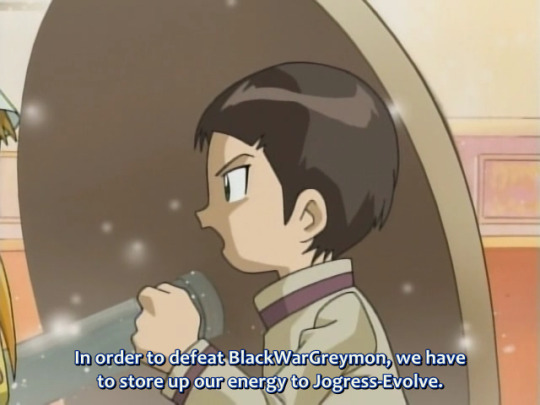
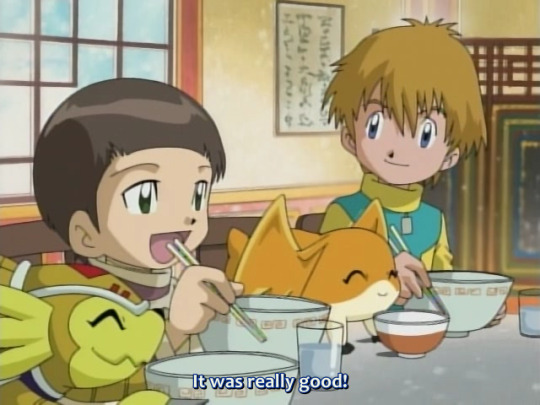

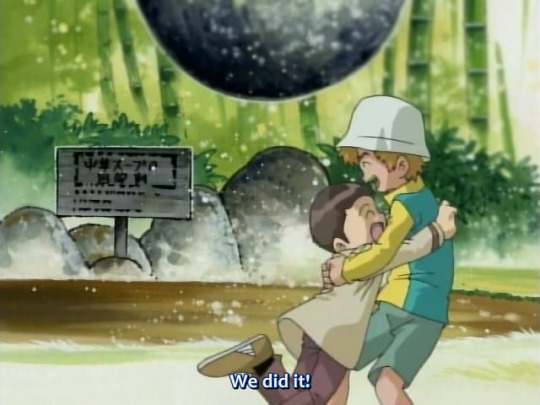
Because Takeru is such a convoluted person, and because Iori’s fundamental issue with approaching things involves unraveling some very deep-seated tendencies in his mentality, the way the two finally connect in order to properly Jogress requires something a lot more convoluted than just happening to clash in a single magical moment like Daisuke and Ken or Miyako and Hikari did. Iori starts off the episode catching himself when he’s about to fall back into “principles over practicality” again -- he starts railing on the others for (in his mind) taking the impending BlackWarGreymon fight too lightly, before Armadimon reminds him that he’s hungry, and Iori realizes -- again -- that he cannot effectively enforce “the right or wrong thing to do” without taking other people’s feelings properly into account. Realizing that this is is a barrier between him and the others, especially Takeru, Iori tries to adjust his thinking pattern and even becomes the one to advocate that everyone get some proper food and rest instead of charging into the fight unprepared.
The meal results in Iori getting yet another rare moment of letting himself truly enjoy something without restraint, and is also followed by Takeru speaking openly to him about their potential Jogress -- openly, honestly, not covering it up, not even with the same light playfulness he would usually put on (including what he had with the very same topic at the beginning of this episode). It is an acknowledgment from Takeru’s own part that he’s been watching what Iori’s doing and also wants to connect, and an open and serious statement from someone who had constantly tried to cover up everything with a smile up until that point, and, with the two reaching an understanding, they finally achieve their Jogress at the end of the episode.
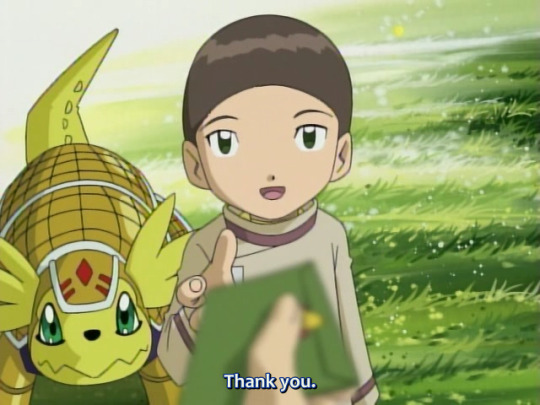
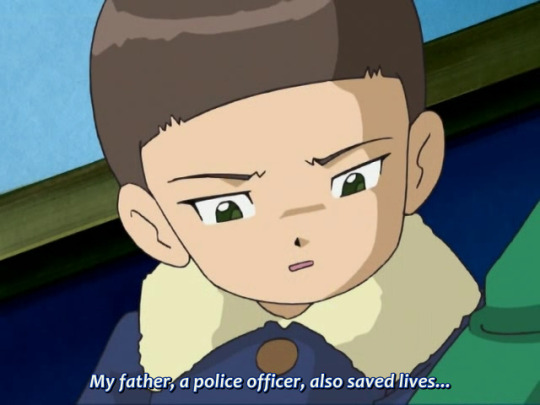
This connection with Takeru, and the understanding that came from it, is what allows Iori to start applying a bit more flexibility towards approaching other situations. 02 episode 38 has him finally accepting Ken’s invitation to his Christmas party, after so many episodes of despising so thoroughly -- because now that he’s taking Ken’s position and feelings into account, he’s able to properly recognize him as someone doing his best to make amends going forward and be friends. Later, in 02 episode 44, despite having originally been the one more staunchly against it on principle, Iori handles the shock of having to kill an enemy with somewhat more grace than Miyako does, because not only had he already started considering the difficulty of fighting an enemy that cannot be reasoned with and wants nothing but wanton destruction (back during the end of 02 episode 29), Takeru is there to remind him that their priority must, first and foremost, be “saving lives” -- like, for instance, the girl in a wheelchair in front of him.
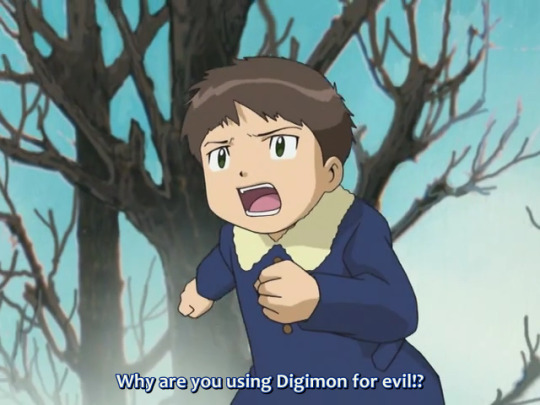
And so, the final episodes of 02 put everything Iori’s learned to the ultimate test, when he learns that the major perpetrator behind it all is none other than a friend of his departed father.
Up until this point, much of Iori’s mentality had been shaped by the rather saintlike image everyone had put up of Hiroki -- it’s almost certain that he must have had his own flaws as a person, but the resistance to speaking ill of the dead, and the generally positive influence he’d had on his friends and family and his untimely death by “protecting someone”, painted him as effectively a perfect, impossible ideal for Iori to strive to. Much of Iori’s justifications for his own behavior had consistently been reliant on “my father said this” or “would my father would have done this?”, such as his reason for forcing down his lunch in 02 episode 3, or using him as a mental model in 02 episode 44. For Iori’s former mentality of “good person” and “bad person”, this is the ultimate contradiction that threatens to rip apart everything Iori had built his own values system on -- that someone so incredible and saintlike and virtuous would be friends with someone so unambiguously doing horrible things like Oikawa. Iori, taking this as an awful emotional blow, parses this with a desperate desire to understand the motive behind why someone would do this, because it’s not enough for him to continue until he does.
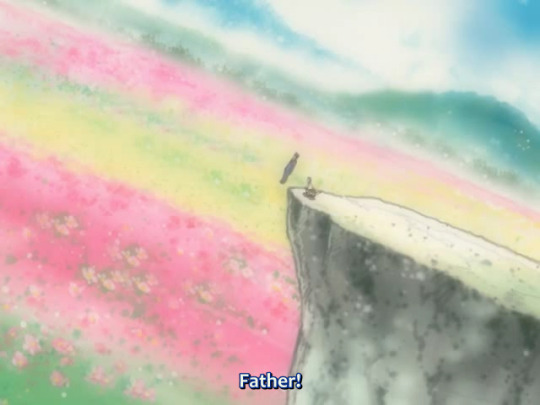
And in 02 episode 49, we see Iori effectively forced to confront the fact that he can’t keep relying on the model of his father anymore as the sole basis for his way of life when, in the end, his father will never return. Iori doesn’t even know him that well; he can’t conjure up an image of him talking, or anything beyond just a flat, serene smile. And when the image of his father finally disappears, Iori almost immediately accepts it, as if he’d known the whole time.
It’s also significant that Iori declares that what he’ll do next is introduce Armadimon to his mother -- because, in the end, Iori is at least now capable of “moving forward”. He can’t get his father back, and the best thing he can do is make use of his existing support group and keep pushing forward with the people he does have in his life -- quite the opposite of Oikawa, who responded to the loss of that exact same person by clutching onto the remnants of the past they shared, and never becoming able to move on.

Hence, 02′s finale ends on none other than Iori, and when you think about it, this is actually a pretty unusual position to be in for someone who’s not the lead protagonist (Daisuke) nor the most prominent focus of the story (Ken)! But it’s a testament to just how important Iori is to this narrative on a thematic level -- all of the struggles about the morality of fighting and the disparity between principles and practicality (which dated all the way back to Adventure), and 02′s prominent theme of coping with loss and regrets and figuring out how to best move on, are all tightly entwined with the character arc of this nine-year-old child. (If you want to take the parallel between the Adventure narrative and Iori even further, Iori and Armadimon sharing the same voice actress is possibly one of the most prominent ways of indicating how a Digimon partner is fundamentally meant to express one’s inner self.)
And especially since Iori is the person who should have been the most vehement about having any kind of sympathy or compassion towards Oikawa -- just remember how determined he was to be cold towards Ken only half a series ago! -- and it leaves a strong impression of the huge, huge journey Iori had gone on through this series. Iori’s arc closes on him understanding the nature of what Oikawa had wanted this whole time, and understanding exactly what it meant for him to make that sacrifice right after finally meeting his partner, and ends the story the most emotionally affected by it -- because, after all, that’s the sort of truly kind person Iori is.
Iori after 02
By the time of Spring 2003, when Iori’s had some time to reflect on it, we learn from Iori that he still does not forgive Oikawa. That in itself is fine; remember, Iori is perfectly within his rights to not do so after all that he’s done. However, again, a distinction must be drawn between whether Iori forgives him, and whether he still considers it to be important to understand the mentality behind why Oikawa did what he did, and to reflect meaningfully on that instead of running himself in circles fixating on a grudge. Again, it’s about going forward with what he knows and has, instead of getting fixated on past deeds -- and with that, Iori resolves to “study”.
In The Door to Summer, we also learn that Iori allegedly has a “girlfriend” -- or, at least, someone Daisuke calls his girlfriend (Daisuke is a bit of an unreliable narrator here, given he’s also totally blown Hikari’s “rejection” of his beach hangout offer up as if it were a full-on total rejection of him completely). It is, perhaps, interesting that Daisuke is capable of getting this impression about Iori’s relationship with someone outside the 02 group, given that he’d been rather isolated from his peers all the way back in 02 episode 3...
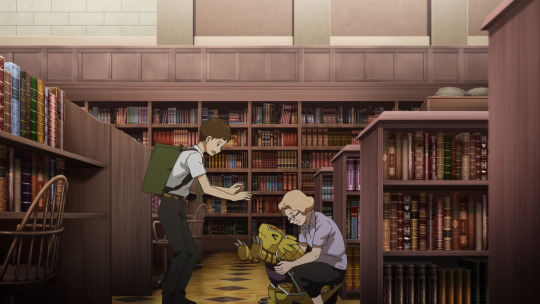
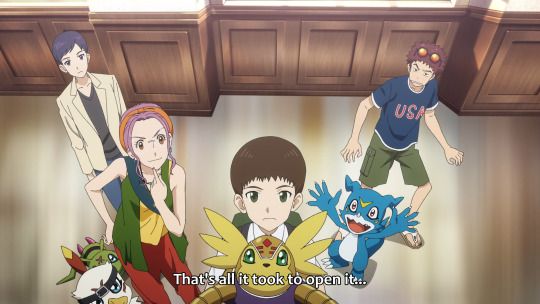
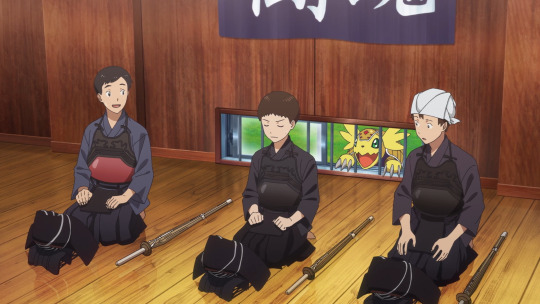
Iori occupies an interesting position in Kizuna, because we only have one point in time where we got to intimately know him, and that was back when he was only nine years old -- and between that and Kizuna, there is a massive eight-year timeskip. He's 17 now, and we don't get any kind of catch-up period in the middle like we did with Takeru and Hikari in 02, and that is a time period where a lot of changes in demeanor could have happened with him compared to all of the others.
At first glance, it seems that he’s gotten much more stoic -- but this is actually something that should reasonably be expected, because now that he’s a teenager, it stands to reason that he would be much better at actually controlling his emotions and not necessarily get overwhelmed as easily. Plus, it’s not like he’s shown to be completely emotionless throughout the movie; he’s just doing a much more graceful job of holding himself back (look carefully at the credits and you can see him sweatdropping at Armadimon barging in on his practice), and moreover you can still see him deliver some pretty direct bluntness about the ramen in New York. Still with formal language, but nevertheless, no flattery is to be had here; Iori will dunk on you if he thinks you deserve it (even if it’s to do with mediocre ramen).
But there are some other interesting observations -- for one, the official website profile states that he’s actually settled on his future career in law at this point, and has made himself extremely busy in order to do so. (On top of that, he at least seems to be on friendly enough terms with his peers at school that they’re happy to greet him on their way out.) The drama CD indicates that Daisuke considers him the busiest out of the entire 02 group -- yet he and Takeru went out of their way to pick him up from school, because he’s that important to them. (Think about it -- how often do you see university students going this far to go retrieve a high school kid to hang out with them?) And likewise, Iori doesn’t even hesitate to state that he’ll make time for them, and throughout the movie he’s conspicuously seen in his school uniform, implying he really is moving things around to make it happen, because they’re that important to him.
He also engages in the single most chaotic action from this group, which is getting Armadimon to break into Menoa’s lab. It’s not that he’d inherently been against this kind of thing before, especially for something important (recall that he’d been happy to sneak into school for Golden Week with the others back during 02 episode 6), but it does beg the question of where and how he got this information that Armadimon could break electric locks. Perhaps he’s become a bit more, ah, pragmatic of a person since 02...
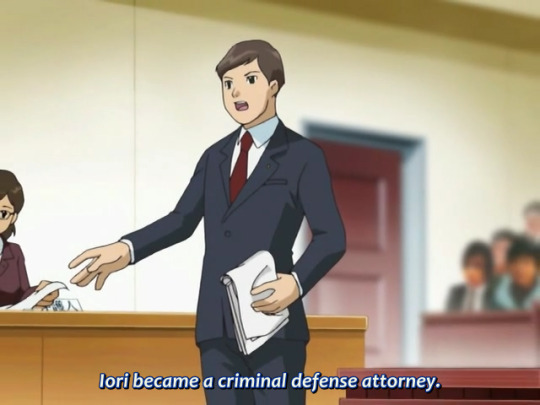
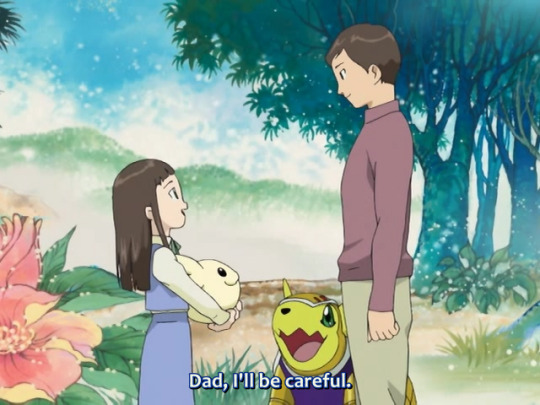
So, in the end, Iori does become an attorney, and specifically a defense attorney (the Japanese law system does draw the distinction). The person who once wanted to stick people he considered to be doing wrong into a “bad people” box and call it a day eventually came to embrace a career that involves understanding people and advocating for their perspective, or at least bargaining for something other than defaulting to the harshest assumption and a solution that allows all of the parties to best productively move forward.
He also has a daughter, who seems to have been raised to be as well-mannered and formal as he was. But, thankfully, he himself is there to help raise and guide her as she grows up.
#digimon#digimon adventure 02#digimon adventure last evolution kizuna#kizuna spoilers#hida iori#iori hida#shihameta
106 notes
·
View notes
Text
Art F City: This Week’s Must-See Art Events: Constructing Paradise or the Devil Giving Birth to the Patriarchy?
Bea Fremderman
It’s a strange week in post-America, indeed, when the least dystopian art event involves Kim Kardashian ass-workout tapes.
That would be Cindy Hinant’s solo show at MuseumofAmericabooks Monday night. Tuesday, perpetual AFC fav Peter Burr is speaking at the New School, and never has the thought of retreating into one of his installations and imagining life in an underground city been so tempting. But if you’re an artist ready to join the resistance, head to ICP School on Wednesday for a discussion about the role of artists in activism during these dark days. Thursday, every opening feels timely, even Mary Beth Edelson’s 1970s feminist mythologies on view at David Lewis. Down the street, Bea Fremderman waxes apocalyptic at Shoot the Lobster, and the New School has an exhibition about the US/Mexican border that will probably break some hearts.
The weekend brings more timely events, such as David Diao exhibition about his childhood experiences as a refugee (at Postmasters) and a Sunday conference at the New Museum about bodies under duress. Come get advice from lawyers and activists about civil disobedience, the migrant crisis, environmental crises, and more.
M
T
W
T
F
S
S
Mon
MuseumofAmericabooks
18 Herkimer Pl. Brooklyn, NY 6:00 p.m. - 9:00 p.m.Website
Cindy Hinant: Exercise Videos
Cindy Hinant mines the bowels of pop culture detritus for her series “Exercise Videos”. Namely, Kim Kardashian’s booty-sculpting workout tapes. Each of these—”Ultimate Butt Body Sculpt”, “Butt Blasting Cardio Step”, and “Amazing Abs Body Sculpt”—features Kim K. excitedly talking about her routines while the screen slowly fills with the dominant color from each tape’s packaging.
This reduces the content to color fields, referencing the graphic design of consumerism and “the construction of gendered identities and the aspirational aspects of celebrity culture.”
But has anyone made video art from the sex tape that started it all?
Tue
Austrian Cultural Forum
11 East 52nd Street New York, NY 6:00 p.m. - 8:00 p.m.Website
Constructing Paradise
Curated by Dieter Buchhart and Mathias Kessler, this exhibition traces the invention of “exoticism” to 19th Century colonialism and reactionary thinking to Europe’s rapid industrialization. The show includes art historical names such as Paul Gauguin alongside contemporary artists who deal with the consequences of colonialism, such as Kara Walker and Mickalene Thomas.
The New School
2 West 13th Street New York, NY 7:00 p.m. - 9:00 p.m.Website
Peter Burr Artist Talk
We can’t gush enough about how much we love Peter Burr’s work. His immersive video installations and world-building semi-abstract, semi-narrative animations are hypnotic and wholly transporting.
In this talk, part of the New York Comics & Picture-story Symposium, expect talk of sci-fi dystopias and utopias, video games, and new approaches to cinema. This is a must-see for any digital art/moving-image fans.
Wed
Michelson Theater, Tisch School of the Arts
721 Broadway New York, NY 6:30 p.m.Website
Film Screening: Amos Vogel and Cinema 16
Presented in conjunction with with the exhibition Inventing Downtown:Artist-Run Galleries in New York City, 1952–1965, on view at NYU’s Grey Art Gallery, this screening night pays tribute to the artist-run Cinema 16 society. Founded by Amos Vogel in 1947, Cinema 16 attracted a variety of artists working in avant-garde film making at the midcentury.
Films:
Arne Sucksdorff, A Divided World (10 min.), Oskar Fischinger, Allegretto (3 min.), Kenneth Anger, Fireworks (15 min.), Weegee and Amos Vogel, Weegee’s New York (33 min). Stan Brakhage, Loving (6 min), Robert Breer, A Man and His Dog Out for Air (3 min). Selected and introduced by Scott MacDonald, visiting professor of Art History, Hamilton College.
ICP School
1114 Avenue of the Americas New York, NY 6:30 p.m. - 8:30 p.m.Website
Visual Resistance: An exploration of the role images play in resistance, protest, and social movements with WRRQ Collective
Quito Ziegler and Kristen P. Lovell, founding members of the queer activist WRRQ Collective, will lead a discussion on the role of visual culture in resistance movements. This is a great opportunity for artists who are wondering how to make themselves useful in this fucked up era. Beyond the theoretical, community groups who need visual support will be there, so you can partner with cause there and then.
Thu
David Lewis
88 Eldridge Street New York, NY 2:00 p.m. - 6:00 p.m.Website
Mary Beth Edelson: The Devil Giving Birth to the Patriarchy
Mary Beth Edelson’s 1970s collages depict strange, invented feminist mythologies. In today’s political climate, where the women’s movement feels like it’s been set back about 4 decades, the goddess demons holding severed heads bring to mind the Frantz Fanon quote “Either one must remain terrified or become terrifying…”
But the scariest thing about this show is how timely it feels. Where’s a destruction goddess when you need one?
Shoot the Lobster
138 Eldridge Street New York, NY 6:00 p.m. - 8:00 p.m.Website
Bea Fremderman: How To Do Nothing With Nobody All Alone By Yourself
The doomsday clock is hastening. Never has the end of the world as we know it felt so viscerally within reach. Bea Fremderman’s press release discusses “the apocalypse” as a series of potentials, one that could mean the collapse of capitalism, or a more sinister and violent end brought about by corporate/military/quasi-governmental conspiracy.
We’re not sure what the work here will look like, but the sole image of a Blackberry reimagined as a laughably ineffective hatchet is a compelling one. “Obsolete” technology repurposed as a survival tool? Or illustrating the reality of weaponized communication? In an era where Tweets bring us ever closer to the precipice of disaster, either reading feels urgent.
The New School
2 West 13th Street New York, NY 6:00 p.m. - 8:00 p.m.Website
State of Exception/Estado de Excepción
This likely-heartbreaking exhibition includes video shot at the US/Mexico border by Richard Barnes alongside found objects accumulated as part of University of Michigan anthropologist Jason De León’s Undocumented Migration project. These include the personal affects (backpacks, clothing, etc…) of migrants during the difficult desert crossing. State of Exception, created by artist/photographer Richard Barnes, artist/curator Amanda Krugliak, and De León, also includes audio interviews with the undocumented people making the journey. Bring the tissues.
Fri
A.I.R. GALLERY
155 Plymouth Street Brooklyn, NY 7:00 p.m.Website
Bailey Scieszka: The Soft Side of Hardcore
In this performance by Bailey Scieszka, we’ll meet “Old Put the Clown.” I don’t know what that entails exactly, but based on Scieszka’s video work I’ve seen, I’d expect it to be creepy and hilarious at the same time.
Ouchi Gallery
170 Tillary Street Brooklyn, NY 7:00 p.m. - 10:00 p.m.Website
11th 100 EXHIBITION
Ouchi (Japanese for “home”) is a DUMBO gallery in a domestic-feeling space, which for over 10 years has hosted the 100 exhibition series annually. The show brings together 100 artists from Japan, the United States, and beyond for a group show with works about one topic. Unfortunately, this is the last year. To celebrate, the theme for this 100 show is “home.”
Artists: Naoaki Funayama, KAYANO USHIYAMA, TOMOYA ONOUE, Shigeru K, Satsuki Omura, Ayako Okada, Masumi Yoshida, TAKASHI, Kumi Hirose, Lisa Kogawa, kyo→ko, Fumiko Watanab, YOSHIE HIRANO, Tetsuya Furuhara, Yoshi, sato, TOMO, Natsuki Wakita, Saida Shoko, HIRO, Wazen, MEIKO YAGINO, Narayama Furano, Jun Kawashima, Yuki Hemmi, TOYONOBU, Haru, Masashige Furuya, Ayako Bando, Takahiro KOYAMA, Juri Nakano, Hiro Ito, Mayumi Ikejiri, Takuro Hinokio, Yuri Sakai, Shoran, Masako Masukata, Emi Watanabe, Kazuya, Akiko Noda, Ushimaru Saeki, Fumiaki Asai, kaoru, Yoko Iogawa, nana, Keiko Nabila Yamazaki, Misato Takahashi, Tharanga Goonetilleke, Cherry Yiu, Henry MInata, Daisuke Yamada, Tsukamaiko, Takako Hida, MEGUMI OGAWA, Takayuki Nomura, ChIIkako Rosy, Silvia Aviles, chakory dey, Megumi Chiaya, Asami Tatuda, felicia van ham, felli, grace emery foster, gretchen robinette, Keith dragon mackie, laramie flick, lola jiblazee, nana sampongart, tornado byrne, abigail puritz, alex nowak, alexis men-ra, burnet griffin iv, wimpy af
Sat
Postmasters Gallery
54 Franklin Street New York, NY 5:30 p.m. - 8:00 p.m.Website
David Diao: HongKong Boyhood
David Diao’s paintings take their cues from modernist abstraction and data visualization—from personal narratives to the political histories that inform them. Namely, Diao’s turbulent childhood spent fleeing the mainland Chinese revolution, to chaotic Hong Kong before ultimately moving to New York City. These paintings can manifest as diagrams of his family’s home (no other photographs or documentation survive) to geopolitical maps.
La MaMa Galleria
47 Great Jones Street New York, NY 6:00 p.m. - 8:00 p.m.
Closing Reception: Lintel, Mantel, Module, Shelf
Curated by Samuel Draxler, this group show features artists making work that somehow subverts mass-produced domestic environments. We hope to make it to the closing, as GaHee Park is one of favorite new painters. However she subverts mass-produced space, we expect it to include weird, weird nudity.
Lauren Bakst & Yuri Masnyj, Elliott Jerome Brown Jr., Mary-Ann Monforton, GaHee Park, Isaac Pool
Meyohas
181 E 90th St. New York, NY 7:00 p.m. - 10:00 p.m.Website
Jonathan Mildenberg: THE TRANSITION OF POWER
The phrase THE TRANSITION OF POWER might bring to mind the recent, disastrous transfer of the Oval Office, but this exhibition is informed by an older socio-political tragedy (albeit one that undoubtedly shaped our troubled electoral maps). Jonathan Mildenberg’s sculptural works are inspired by “red lining”, the early-to-mid 20th Century policy of denying mortgages to ethnically diverse, high-density city neighborhoods. The practice essentially forced prospective homeowners to move to segregated suburbs, far more than choice on the “free market”. Here, Mildenberg reflects on the bank and the garden as two aesthetic environments related to the spatial politics of American housing injustice. Should be an interesting show.
Sun
New Museum
235 Bowery New York, NY 11:30 a.m. - 6:00 p.m.Website
Body Politic: From Rights to Resistance
A.K. Burns, the artist-in-residence through the Department of Education and Public Engagement’s Spring R&D Season, has organized a mini conference to prepare us for the battles ahead. Lawyers, activists, and organizers will discuss “the body under duress.” This topic includes environmental and immigration injustice as well as modes of civil disobedience and resistance.
Participants include representatives from Center for Constitutional Rights, the Center for Reproductive Rights, the New York Civil Liberties Union, the New York Environmental Law and Justice Project, and the Sylvia Rivera Law Project.
Session One 11:30 AM–2 PM Civil Disobedience, Protest, and Healthcare
Session Two: 3–6:00 PM Policing, Prisons, Immigration, and Environmental Contamination
RSVP to attend. We highly recommend this.
from Art F City http://ift.tt/2kGGLv9 via IFTTT
0 notes
Note
Tell me all your HCs for Arukeni, Mummy, Oikawa and 02 kids òvó
Whohoho there, bud, careful, I’ve had 16 years to think up headcanons, this is dangerous .-.;; Let’s do this, like, in installments? Maybe we’ll start with three headcanons each for the 02 kids? Let’s do that.
Daisuke
Daisuke’s goggles are flimsy plastic cosplay goggles Jun got for a Halloween costume in 2000. Daisuke found them the day before starting fourth grade. Knowing he won’t see Taichi in school anymore since his senpai was starting middle school, he arrived at the Yagami household the next morning to show them off before school. The goggles miraculously survived a single year on Daisuke’s noggin before he became a Chosen Child and broke them.
Daisuke loves watching soccer just as much as he loves playing it. He shares this love with his father, who is part Brazilian and treats association football almost like a religion. Daisuke and his father are both fans of the Tokyo Verdy team, even when it’s demoted to the second tier league in 2006, and of São Paulo FC. During the FIFA 2002 World Cup, Daisuke’s father scored two tickets to the semifinal game between Brazil and Turkey for his birthday, and took Daisuke (and a stowaway Chibimon) with him. It was one of the best days of Daisuke’s life.
One of Daisuke’s hobbies is trying any new kind of junk food he finds. From seasonal KitKat flavors to weird popsicles, Daisuke will try anything. And he hasn’t gotten food poisoning even once! Daisuke’s friends like hanging around Daisuke when he tries weird stuff, because his reactions are hilarious, and he loves sharing whatever he does find appetizing.
Miyako
From the moment she enters the educational system, Miyako is one of the most popular students wherever she goes. No one can resist her passionate and bubbly personality, and she’s always eager to use her skills to help others. She also has an exceptional ability to keep in touch with old friends. She’s basically the queen of networking.
Miyako has a habit of picking up new hobbies, getting really into them, and then losing interest and moving to something else. As such, aside from her expertise in computers (the only hobby that ever stuck), she’s kind of a jack of all trades and knows a lot of random facts and skills. As per the Spring 2003 CD drama, she picks up tea appreciation in the beginning of middle school, and has additionally dabbled in origami, Lego, crocheting, soapmaking, astronomy, kendama tricks, dream interpretation, flip books, and collectible tenugui.
Miyako realizes she’s bisexual rather early on in her childhood, and by the time she’s in her last year of middle school is passionately out and very outspoken about LGBTQ rights. As an adult, she attends Pride annually and brings Hawkmon, Ken and the kids. It’s one of her favorite times of the year, especially since she gets to dress everyone in cute Pride-themed clothes and no one calls it tacky. Hawkmon even has a bisexual flag color headband Miyako crocheted that he wears with great honor.
Iori
By the time of 02, the Hida household had about 15 large photo albums containing photographs of Iori. 14 of them chronicle Iori from before he was born (in the form of ultrasound photos) until mid-summer 1999. The last album contains photos of Iori after Hiroki’s death. Hiroki was the avid photographer in the family, and was extremely enthusiastic about showing off his beloved son. After Iori becomes a Chosen Child, Hikari makes sure the Hidas have enough new photos of Iori to fill a new album annually.
Iori loves helping his mother prepare meals, especially the traditional Japanese cuisine she excels at. On every birthday, Fumiko teaches him how to make a Japanese sweet of his choice.
Iori is an avid reader. By the beginning of third grade, Iori can read at a sixth grade level, and knows all his Kyoiku kanji, though he’s only slightly more advanced than the rest of his classmates at writing the kanji due to lack of opportunities to practice. He is exceedingly humble about this, per usual, and gets uncomfortable when praised for it. To encourage his progress without embarrassing him, Iori’s homeroom teacher takes to offhandedly mentioning books she knows Iori would enjoy and benefit from reading.
Ken
Ken has no sense of fashion and has no idea how to match colors. He’s very aware of this and thus very grateful for the existence of school uniforms and suits. He relies on his mother to buy his casual clothes well into college, and Miyako picks up the reins once they get married, after which most of his clothes are grey or black because they’re both not the best with color matching and what works for Miyako doesn’t necessarily work for Ken. The epilogue outfit is entirely Ken’s fault, a rare attempt at dressing himself, though Miyako is the one who let him wear it because she knew the other Chosen would helpfully tell Ken to get rid of that horrid jacket.
Ken is a very clean person, and finds soaking in baths very soothing, especially after his Kaiser period when he really needs to relax and forgive himself a little. In middle school, he gains an appreciation for bath salts and bath bombs, though he does his best to keep it a secret because it’s seen as kind of a weeny hobby. When Daisuke and Miyako find out by accident, they tease Ken mercilessly for about five minutes, and then drag him to Lush so they can each buy him a new bath bomb.
Ken started learning Spanish under the Dark Seed’s influence on a whim, but when he went back to being his old self and his proficiency didn’t go away, he realized he actually does have a knack for languages. The next language he learned was German, and he enjoyed taking it slow and learning at a normal pace. As an adult, Ken is a polyglot, fluent in a dozen languages and conversational in six more, including a proficiency in Japanese sign language.
26 notes
·
View notes